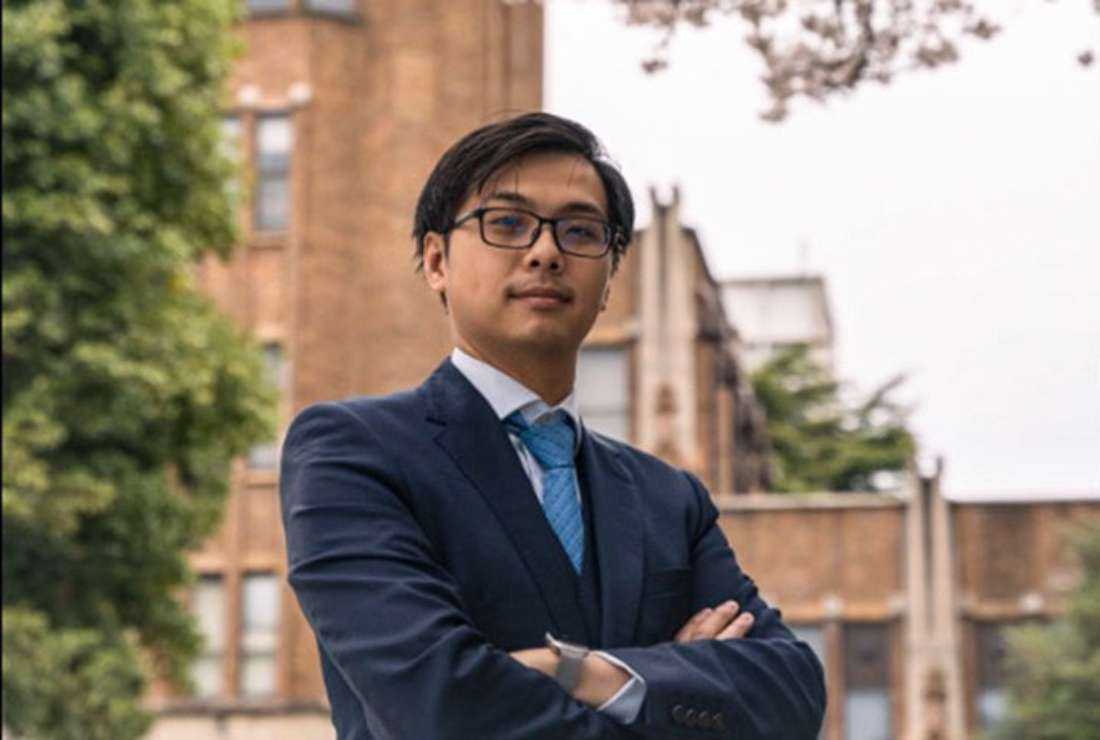
Former Hong Kong district councilor Sam Yip, who fled the crackdown in the city to live in Japan, initiated the letter calling for the international community to withdraw recognition for the city's legislature. (Photo: Ye Jinlong via RFA)
Some 20 former elected district councilors living in exile have strongly condemned Hong Kong’s legislature after it voted to drastically slash the number of elected district council seats, says a report.
In a joint letter, the "last elected district councilors" of Hong Kong have called on the international community to withdraw the official recognition of Hong Kong's Legislative and District Councils, which no longer "legally represent the people of Hong Kong."
The reaction came after the legislature voted last week to reduce the directly elected district council seats from 452 to 88, Radio Free Asia (RFA) reported on July 10.
The joint letter was drafted by Sam Yip, a former Shek Tong Tsui district councilor who fled to Japan following the Hong Kong government's crackdown on democrats.
Yip termed the latest legislation as "the death knell" for democracy in the city.
"Under the framework of the Hong Kong government's so-called 'patriots governing Hong Kong' policy, candidates must show their loyalty to the Chinese Communist Party before they can run for election," Yip said.
"[They have to] go to these pro-government people to get nominated," Yip further added.
Hong Kong’s legislature nominated and selected the city's current Chief Executive John Lee, a Catholic, in an election where he was the only candidate, in May last year.
In a July 8 statement, Lee welcomed the changes in the district council election rules and stated that the move ensured the city would be safe in the hands of the "patriots."
"We must... completely exclude those anti-China and destabilizing forces from the District Councils," Lee said.
Lee said the government is looking for candidates who are "capable, experienced, with relevant skill sets suited to the needs of the districts, and patriotic."
He further added that "this legislative exercise [will] ensure that the District Councils are firmly in the hands of patriots."
According to the new election rules that took effect on July 10, electoral candidates must pass a national security background check and secure at least three nominations from committees loyal to the ruling Chinese Communist Party (CCP) in Beijing.
Ted Hui, a former Legislative Council member and district councilor said that the public opinion which they represented "still exists."
"Maybe we would never get through the government's review process ... but the public opinion we represented still exists," Hui said.
"We may scatter all over the world, but we still want to serve the people of Hong Kong," Hui further added.
Hui is wanted by the national security police for "collusion with foreign forces."
Daniel Kwok, a former Hong Kong district councilor now living in the United Kingdom, alleged that the entire political system in Hong Kong is a sham and is only aimed at suppressing dissenting voices.
"The motivation is clear -- it's to cling to the principle that only patriots can rule Hong Kong and eliminate any of the voices of the so-called 'anti-China chaotic elements' in Hong Kong," Kwok said.
Kwok pointed out that "many Western democracies may not have a timely understanding of the situation" and that the matter was yet to be formally discussed at the United Nations Human Rights Council.
"We have to keep on speaking out and keep the issue alive in the international community," Kwok said.
In a July 6 statement, the European Union (EU) criticized that the reforms in Hong Kong go against China’s promises of democratic representation during the 1997 British handover.
"This severely weakens the ability of the people of Hong Kong to choose representatives overlooking district affairs," the EU said, noting that the decision follows the imposition of a draconian national security law on Hong Kong in July 2020.
"These developments raise serious questions about the state of fundamental freedoms, democracy, and political pluralism in Hong Kong that were supposed to remain protected until at least 2047 under the Sino-British Joint Declaration of 1984 and China's international commitments," the EU said.
The Hong Kong authorities had "vehemently rejected" the EU statement saying that the bloc was "interfering in Hong Kong matters, which are purely China's internal affairs."


